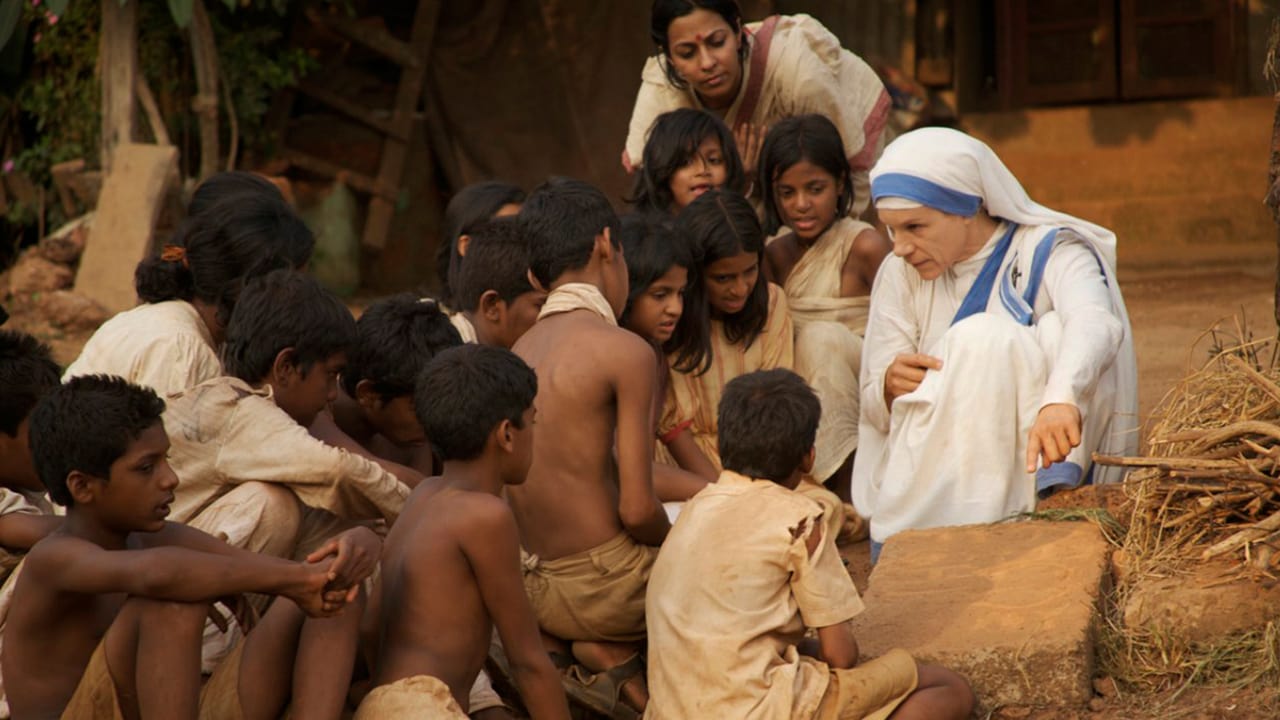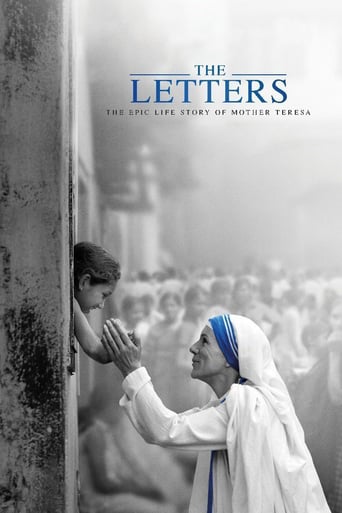

This train wreck of a "movie" is the apparent darker side of Mother Teresa's story about secret letters that she wrote. These letters reveal a darker side to Teresa, stating that she had struggles with her faith, yet even in her hard times she stayed in the faith and continued to put others above herself. At Least that's what the audience is told, the plot of the movie, the most interesting aspect of this adaptation isn't shown or expanded upon, instead it is told to us multiple times throughout the movie all in different ways that reveal nothing new. Since the movie tries to tell Mother Teresa's story in a new perspective while trying to be "safe" the movie falls flat on it's face becoming lifeless, bland, and uninformative. I went into the movie knowing just as much as I did leaving it, Mother Teresa was a nun who helped the untouchables, nothing more nothing less, everything that is more interesting about her story is either told to the audience by a confusing narration or given to the audience on tacked on credit facts that are supposed to tie up the movies loose ends.I give The Letters a very low C, almost to the point of F, but since the movie was so safe it deserves a C. The movie begins on a scene where a photo of mother Teresa heals a woman of a tumor, this event technically did happen but no one can be sure that it was Teresa's photo. It's a poor scene to start the movie on because it set's mother Teresa up to be a supernatural force of God, which she is not! It was also a poor choice to open on because the event is filled with so much uncertainty that it's more probable than not that it didn't happen, thus starting the movie with possible inaccuracies. Another thing the movie blundered on was Mother Teresa's religion, throughout the movie she is called a Christian woman, yet she was a catholic nun. Given the benefit of the doubt Christianity is a term that is notably used for multiple religions, like the Catholic people. Yet the rest of the movie is very safe, it doesn't take any risks or any controversial aspects of Teresa's life, instead they made a very easy movie that panders to the average viewer who doesn't know better than.The reason I specifically wanted to give this movie a F was because how terribly represented Mother Teresa was, she was stripped of all likability and all visible motivation for what she was doing, it also ignored key factors of her life while somehow including them. For example the darkness that was continually spoken of, they mention it multiple times throughout the movie, yet not once did we see Mother Teresa actually convey or experience any signs of deeper darkness or doubt, instead she smiles and goes through the motion. The introduction of her character and her will to go help people was so underdeveloped that I didn't realize that she was Mother Teresa until multiple scenes later in the movie. Yet the reason I didn't give the movie an F is because the movie followed the most minimum basic beats of Mother Teresa's life, only showing what they wanted to and being, for the most part, accurate. Yet the absence of many of the other important aspects of her life make this movie a slightly biased representation of her life. This may sound like nitpicking but I truly believe what I listed above hinders the historical accuracy of this movie. This is not a movie I would recommend to view for a class, for if you are studying Mother Teresa this movie will not introduce anything new, and it may hinder what knowledge you already have.
... View MoreThe Letters is an absorbing and interesting film on the life of Mother Teresa of Calcutta. Revealing her accomplishments but concentrating on her trials and tribulations--and her bouts with "spiritual darkness"--it has a different perspective than previous films about Mother Teresa. Max von Sydow and Rutger Hauer were excellent, as usual. The rest of the cast were very good, although some presented as somewhat rigid, but that might have been on the part of the script. Juliet Stevenson, however,was exceptional. Her posture and mannerisms were reminiscent of those of Mother Teresa. The cinematography and editing were well done. The film is certainly worth watching, and a good biographical rendering, contrary to the unsubstantiated and unreferenced accusations about Mother Teresa offered by angry, unkind persons influenced by the same agendas fostered by the late Christopher Hitchens.
... View MoreI have no idea why this beautiful movie is rated so low in the IMDb rating system, obviously a lot of people didn't care for it. I am surprised. First, I am not a Catholic but I am a religious person. I believe this is a beautiful and touching biopic about a kind and good woman who sacrificed her life in service to the poor. Although she had doubts and struggled with depression, she soldiered on bringing relief to the one of the world's most retched group – India's untouchables. A humble woman, Mother Teresa, ably played by Juliet Stevenson is traced through a 50-year career of kindness and compassion. I am nonplussed, what is there not to like here? I loved this poignant movie and urge those of you with hearts to see it too.
... View MoreDisclaimer: I was a small investor in this film (I was cold-called about the film 7 years ago when Bill Riead was in the early stages of making the movie, and decided it was a good project). So I have a small financial interest in this movie.I add that I am not catholic (nor even religious), and knew little about mother teresa before I saw this film, so I have no connection to the church, or mother teresa's particular cause.As to the movie, let me start by saying the movie is not a great piece of filmmaking, and has obvious flaws. For example, the narration is stiff and tiresome in places, and the script feels unsophisticated compared to what we're used to these days.ON THE OTHER HAND, despite its flaws, I found the movie to be quite powerful. I think the professional critics have really missed something here. I find it hard to believe that anyone could watch this movie and not be inspired by what this woman did, under the conditions that she did it. If you don't feel like crying at times, then you must have a hard heart. :-) The suffering of those people was off-scale, as was the personal sacrifice of mother teresa, who had to fight to be released from her cush job as a nun/teacher at a fancy girls school, to give her life to the poorest, sickest rejects of society. We should all be more like her.I also want to plug some of the acting: I thought Stevenson was strong (within the limitations of the script), but it was many of the Indian actors (previously unknown to me) who stood out as charismatic and excellent.Bottom line: lower your expectations as to the entertainment value of the film, and go see it for the way it will make you feel. And take your kids -- it's a very good message.
... View More